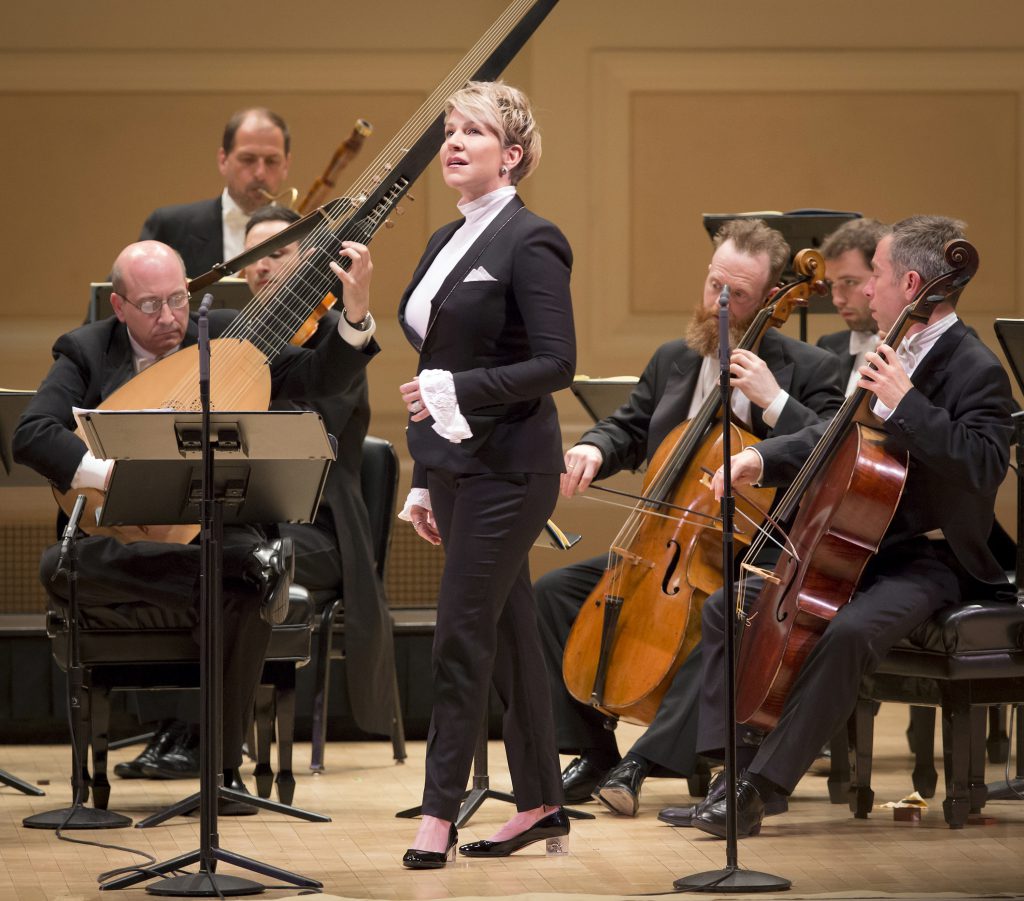DiDonato leads an inspired cast in sensational “Ariodante” at Carnegie

Joyce DiDonato performed the title role in Handel’s “Ariodante” with the English Concert Sunday at Carnegie Hall. Photo: Jennifer Taylor
The renaissance of baroque opera in America shows no signs of slowing down: Carnegie Hall on Sunday afternoon saw a sold-out performance of a four-hour Handel opera, in which Harry Bicket’s English Concert and Joyce DiDonato gave a performance so stunning it was liable to make even the most jaded of early-music skeptics take note.
Handel’s great 1735 opera Ariodante presents the story of a Scottish noble betrothed to Ginevra, daughter of the King, who must overcome the malicious schemes of his rival Polinesso. For all the high stakes of its most dramatic moments, Ariodante feels in a sense like an early-18th-century revue: a collection of free-standing set pieces strung together by a few bars of recitative. Its first act comprises a run of joyous exultations loaded up with absurd fioritura, its second a group of heart-rending outpourings of grief, and its third a mix of cries for vengeance and jubilant reconciliation, culminating in an excruciatingly tidy conclusion that drew copious laughter from the Sunday afternoon audience. Even so, the piece itself is a riveting series of musical thrills, worlds away though it may be from the later musical dramas that make up today’s core repertoire.
There was little question as to Sunday’s star—DiDonato gave a sensational performance of the title role, one that ranks right alongside her greatest triumphs on the Met stage. Her many bel canto roles have shown off her splendid, rippling coloratura time and again, an asset that was thrown into only starker relief by Handel’s florid writing. She handled even the most treacherous runs with ease, making a true tour de force out of the demanding aria “Con l’ali di costanza.” A cool, flowing sound and soft glow come naturally to her, and yet she can inject passionate fire seemingly with the flip of a switch.
Her most stunning moments came not when she was flashing that splendid coloratura technique, but in her character’s most intimate thoughts. Act II’s “Scherza infida,” a quiet expression of anguish at Ginevra’s apparent infidelity, was spellbinding, as DiDonato showed a softer luster to her tone, contrasting with the role’s dominant direct, forward fire. She allowed herself for a bar or two to drop to a pianissimo in a shattering instant of vulnerability. Bicket and the ensemble were right with her, their sound suddenly as delicate as lace under her whispered phrases.
The supporting roles are so rich that the opera verges on an ensemble work. Christiane Karg shone brilliantly as Ginevra, sporting a lovely, liquid, and lightly tart soprano. A combination of filial duty and strong will, she displayed crackling fire in her rapid, fierce excoriation of Polinesso, “Orrida agli occhi miei,” and flashed spectacular, pinpoint coloratura of her own in the sparkling aria “Volate, amori.”
Her fellow soprano Mary Bevan brought a warmer, rounder soprano to the role of the poor, gullible ingénue Dalinda. She was an enchanting presence onstage, and displayed a strong musicality, allowing her phrases to billow beautifully. Angling to steal a few scenes was the contralto Sonia Prina as Polinesso, who strutted around the stage with the self-assured swagger of a punk rocker. She showed a strong command of the demanding trouser role, even if she allowed her vocal characterization to get a little blustery. Her vocal highlight came in the delicious mustachio-twirling aria “Se l’inganno sortisce felice,” where she flaunted blistering triplet coloratura.
David Portillo’s tenor was slightly reedy in the role of Lurcanio, Ariodante’s dutiful but vengeful brother, but he navigated the role with confidence. Matthew Brook plumbed some of the darkest depths of grief in the opera as the King, his luxurious, dark bass-baritone betraying immense pain in his Act II lament “Invida sorte avara.” Tyson Miller showed a sunny tenor as his steward Odoardo.
Through it all, Bicket and the English Concert were nothing short of brilliant. Sporting perfectly tight ensemble, spacious and ringing tone, a variety of colors, gleaming strings and clean, forceful brass, they are the model of a period chamber orchestra in every sense. In stark contrast to the common failing of anemic-sounding historical ensembles, it was no trouble at all for them to summon up ferocious power for dramatic effect, and then cool off with aching sighs.
It’s curious to think that not too long ago, a performance like this one, of a baroque opera on the main stage of Carnegie Hall, would stand out as a real rarity on the season calendar. Now one hardly bats an eye when an international superstar like DiDonato headlines the performance in front of a sell-out crowd. For Handel lovers, we are living in an extraordinary time.
Posted May 05, 2017 at 11:20 am by Vivian R.
It was a stunning performance in every respect. I hope there is talk of a DVD or CD. JDD sings Handel with the intelligence and conviction of a Verdi role.